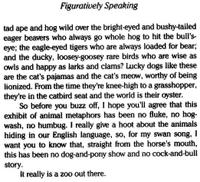Today we're looking at Crazy English by the well-known author and humorist, Richard Lederer.
I have been reading his book and wondering why the HELL everyone likes him so much. I mean, sure, he snags your attention with hilarious graphics,

 but the pictures piqued my interest more than the prose itself! At my reading level, that's not incredibly funny. Some of his information is actually helpful. He does go into some detail about George Bernard Shaw's spelling of "Fish," but he completely disinterests me when he goes ON AND ON for PAGES AND PAGES AND PAGES of clichés. It's annoying! for example- pages 92-92 and 146-147 (click on each picture to enlarge and read):
but the pictures piqued my interest more than the prose itself! At my reading level, that's not incredibly funny. Some of his information is actually helpful. He does go into some detail about George Bernard Shaw's spelling of "Fish," but he completely disinterests me when he goes ON AND ON for PAGES AND PAGES AND PAGES of clichés. It's annoying! for example- pages 92-92 and 146-147 (click on each picture to enlarge and read):
There are some quotable notables in the book. For instance:
"Why is it that a woman can man a station but a man can't woman one, that a man can father a movement but a woman can't mother one, and that a king rules a kingdom but a queen doesn't rule a queendom? How did all those Renaissance men preproduce when there don't seem to have been any Renaissance women?"
"An oxymoron is a figure of speech in which two incongruous, contradicoty temrs are yoked together in a small place. [...] Appropriately, the word oxymoron is itself oxymoronic because it is formed from two Greek roots of opposite meaing-- oxys, "sharp, keen," and moros, "foolish," the same root that gives us the word moron. Two other examples of foreign word parts oxymoronically drawn to each other are pianoforte "soft-loud," and sophomore, 'wise fool.'"
Lederer promises readers that they are about to embark on "The Ultimate Joy Ride Through Our Language." What the reader really receives is a brutal, philological equivalent to the It's a Small World After All ride at Disney World that lasts for 188 pages. The work makes a running head start into the world of our language... but unfortuantely, it keeps running in a exhausted, annoying circle.
Lederer provides an entire chapter on an interview he had with a man who only speaks in palindromes. While this may be amazing to anyone who can't speak palindromically, I found it idiotic. Wow. Another chapter was the retelling of Chicken Licken in a jive-talk-meets-sesame-street-manner.
I found this book to be mediochre at best, and insulting at worst. This would be an excellent book for someone who knows absolutely nothing about the history of the English language. However, it didn't whip me into a mental frenzy. He pointed out all of the colloquialisms, euphemisms, and idiotisms in the English languages. He gave us amusing pictures, hilarious chapter titles, and funny anectdotes. I learned the meaning of "sophomore" when I was in 10th grade.
He's all bread and no balogna. If i could throw-up the sandwich he fed me, I would. Unfortunately, you can't un-read a book.






No comments:
Post a Comment